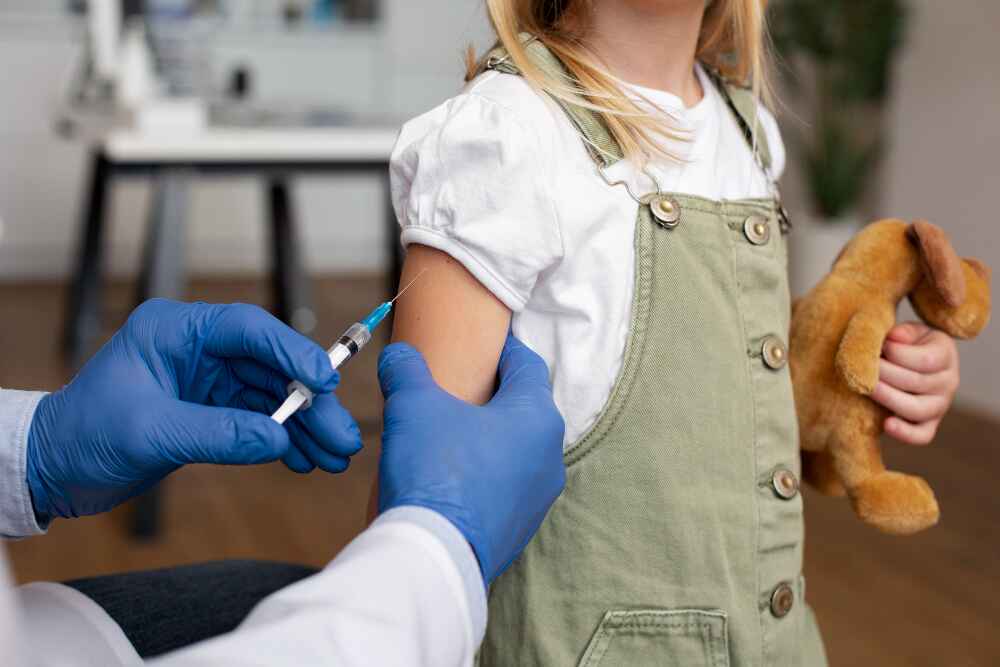National Infant Immunization Week 2024 - Time to Take Informed Decision to Save Future Generations
The world celebrates National Infant Immunization Week (NIIW) every year in the last week of April. This event aims to raise awareness and promote vaccination for diseases that can be prevented by timely vaccination.
In this article, we’ll get into the details of what NIIW is, its importance, how you can get involved, and much more. So, let’s begin.
What is National Infant Immunization Week?
Organized by the Centers for Disease Control and Prevention (CDC) in collaboration with various healthcare professionals and organizations, NIIW is celebrated every year.
It’s a dedicated time to raise awareness about protecting infants and young children from vaccine-preventable diseases (VPDs). This year, NIIW time is from April 22nd to 29th, 2024, highlighting the critical role of on-time vaccinations in ensuring a healthy future for our youngest generation.
Importance of National Infant Immunization Awareness Week
Vaccines are one of the most effective public health interventions ever developed. They work by exposing the body to a weakened or inactive form of a virus or bacteria, which triggers the immune system to develop antibodies. These antibodies provide long-term protection against the disease, preventing severe illness, hospitalization, and even death.
NIIW focuses on immunizing infants and young children because they are particularly vulnerable to vaccine-preventable diseases (VPDs). Their immune systems are still developing, making them more susceptible to infections. Vaccines help provide the necessary protection during this crucial period.
Here is why National Infant Immunization Week is important:
- Raises awareness. It educates parents, caregivers, and the public about the dangers of VPDs and the effectiveness of vaccines in preventing them.
- Encourages on-time vaccination. NIIW emphasizes the importance of staying on schedule with well-child visits and recommended infant vaccinations. These timely vaccinations ensure optimal protection against serious illnesses.
- Celebrates achievements. The week also recognizes the progress made in immunization programs and highlights the collective effort of healthcare providers, communities, and families in promoting healthy children.
Which Diseases Are Preventable By Vaccination?
There are many vaccine-preventable diseases (VPDs) that can be prevented with the help of vaccination. These VPDs were once common but are now rare and have even been eliminated from countries like the United States that take vaccination seriously. Here are some of the diseases that vaccines protect against:
- Measles, Mumps, and Rubella (MMR)
- Diphtheria, Tetanus, and Pertussis (DTaP)
- Polio
- Hepatitis B
- Rotavirus
- Pneumococcal disease
- Haemophilus influenzae type b (Hib)
- Meningococcal disease
- Varicella (chickenpox)
- Human Papillomavirus (HPV)
These diseases can cause a range of serious complications, including:
- Pneumonia
- Encephalitis (swelling of the brain)
- Deafness
- Blindness
- Developmental delays
- Death
Why It’s Important to Get Your Infants Vaccinated?
Vaccination is crucial to protect your children from serious health issues that can even be life-threatening. Here are some reasons why getting your infants vaccinated is important:
- Provides individual protection. Vaccines provide each child with the specific immunity they need to fight off VPDs.
- Develops herd immunity. When a high percentage of the population is vaccinated, it creates herd immunity, indirectly protecting those who cannot be vaccinated due to medical conditions or young age. This prevents outbreaks and protects the entire community.
- Reduces healthcare costs. Vaccinations are significantly less expensive than treating VPDs, saving families and the healthcare system money.
- Improves quality of life. By preventing serious illnesses and disabilities, vaccinations help children lead healthy and productive lives.
Common Concerns About Vaccinations
Some parents may have concerns about vaccine safety or effectiveness. It’s crucial to rely on trusted sources of information, such as the CDC and AAP, for accurate and up-to-date information about vaccines. These resources can address common questions and debunk the common myths about vaccines.
Here are some key points to remember about vaccine safety to feel safe while getting your little ones vaccinated this year:
- Vaccines undergo rigorous testing before being approved for use.
- Millions of children have been safely vaccinated over the years.
- The benefits of vaccines far outweigh the risks.
So, you must forget the myths about vaccination and take steps to save your children from future VPDs by timely vaccination. It’s your responsibility as a parent to make informed decisions backed up by accurate information to ensure the health and well-being of your children.
What Role Can You Play in Making This National Infant Immunization Week Effective?
You can contribute to the National Infant Immunization Awareness Week (NIIW) as a healthcare or non-healthcare worker too. Here is what you can do:
As a Healthcare Worker
During NIWW, as a healthcare worker, you are responsible for promoting the benefits of vaccination and debunking the myths about vaccination. You have to encourage the families by informing them of the benefits and safety of vaccinations for their children. Finally, administrating the vaccination process to ensure safety is another responsibility you must take seriously during NIIW.
As a Non-Healthcare Worker
If you’re not a healthcare worker, you can still play your part in NIIW by raising awareness and promoting the messages to support NIIW. These promotional materials are available to highlight the importance of protecting infants and young children from VPDs. These promotional materials serve as tools for healthcare workers and community leaders to spread awareness about NIIW and encourage active participation in immunization programs.
Join Cure and Craft:
Calling all healthcare professionals, medical students, and writers! Share your insights, experiences, and knowledge on our platform. Let’s craft informative articles together, shaping the future of healthcare. Connect, inspire, and enlighten our audience.





